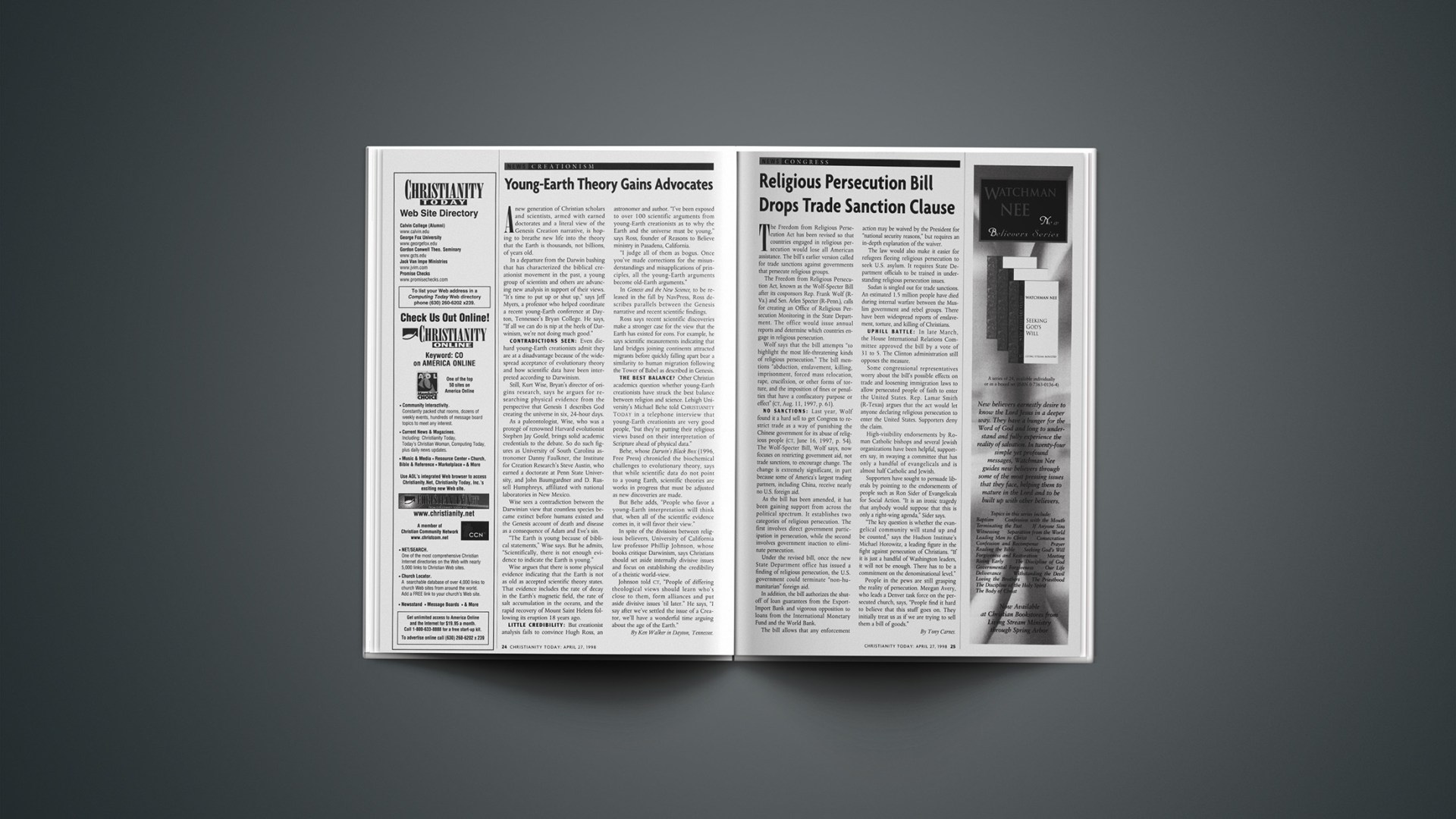The Freedom from Religious Persecution Act has been revised so that countries engaged in religious persecution would lose all American assistance. The bill’s earlier version called for trade sanctions against governments that persecute religious groups.
The Freedom from Religious Persecution Act, known as the Wolf-Specter Bill after its cosponsors Rep. Frank Wolf (R-Va.) and Sen. Arlen Specter (R-Penn.), calls for creating an Office of Religious Persecution Monitoring in the State Department. The office would issue annual reports and determine which countries engage in religious persecution.
Wolf says that the bill attempts “to highlight the most life-threatening kinds of religious persecution.” The bill mentions “abduction, enslavement, killing, imprisonment, forced mass relocation, rape, crucifixion, or other forms of torture, and the imposition of fines or penalties that have a confiscatory purpose or effect” (CT, Aug. 11, 1997, p. 61).
NO SANCTIONS: Last year, Wolf found it a hard sell to get Congress to restrict trade as a way of punishing the Chinese government for its abuse of religious people (CT, June 16, 1997, p. 54). The Wolf-Specter Bill, Wolf says, now focuses on restricting government aid, not trade sanctions, to encourage change. The change is extremely significant, in part because some of America’s largest trading partners, including China, receive nearly no U.S. foreign aid.
As the bill has been amended, it has been gaining support from across the political spectrum. It establishes two categories of religious persecution. The first involves direct government participation in persecution, while the second involves government inaction to eliminate persecution.
Under the revised bill, once the new State Department office has issued a finding of religious persecution, the U.S. government would terminate “non-humanitarian” foreign aid.
In addition, the bill authorizes the shutoff of loan guarantees from the Export-Import Bank and vigorous opposition to loans from the International Monetary Fund and the World Bank.
The bill allows that any enforcement action may be waived by the President for “national security reasons,” but requires an in-depth explanation of the waiver.
The law would also make it easier for refugees fleeing religious persecution to seek U.S. asylum. It requires State Department officials to be trained in understanding religious persecution issues.
Sudan is singled out for trade sanctions. An estimated 1.5 million people have died during internal warfare between the Muslim government and rebel groups. There have been widespread reports of enslavement, torture, and killing of Christians.
UPHILL BATTLE: The bill has yet to receive a favorable vote from the House International Relations Committee. In March, supporters admitted that they had only seven definite yes votes from among 46 committee members.
Some congressional representatives worry about the bill’s possible effects on trade and loosening immigration laws to allow persecuted people of faith to enter the United States. Rep. Lamar Smith (R-Texas) argues that the act would let anyone declaring religious persecution to enter the United States. Supporters deny the claim.
High-visibility endorsements by Roman Catholic bishops and several Jewish organizations have been helpful, supporters say, in swaying a committee that has only a handful of evangelicals and is almost half Catholic and Jewish.
Supporters have sought to persuade liberals by pointing to the endorsements of people such as Ron Sider of Evangelicals for Social Action. “It is an ironic tragedy that anybody would suppose that this is only a right-wing agenda,” Sider says.
“The key question is whether the evangelical community will stand up and be counted,” says the Hudson Institute’s Michael Horowitz, a leading figure in the fight against persecution of Christians. “If it is just a handful of Washington leaders, it will not be enough. There has to be a commitment on the denominational level.”
People in the pews are still grasping the reality of persecution. Meegan Avery, who leads a Denver task force on the persecuted church, says, “People find it hard to believe that this stuff goes on. They initially treat us as if we are trying to sell them a bill of goods.”
Copyright © 1998 Christianity Today. Click for reprint information.










